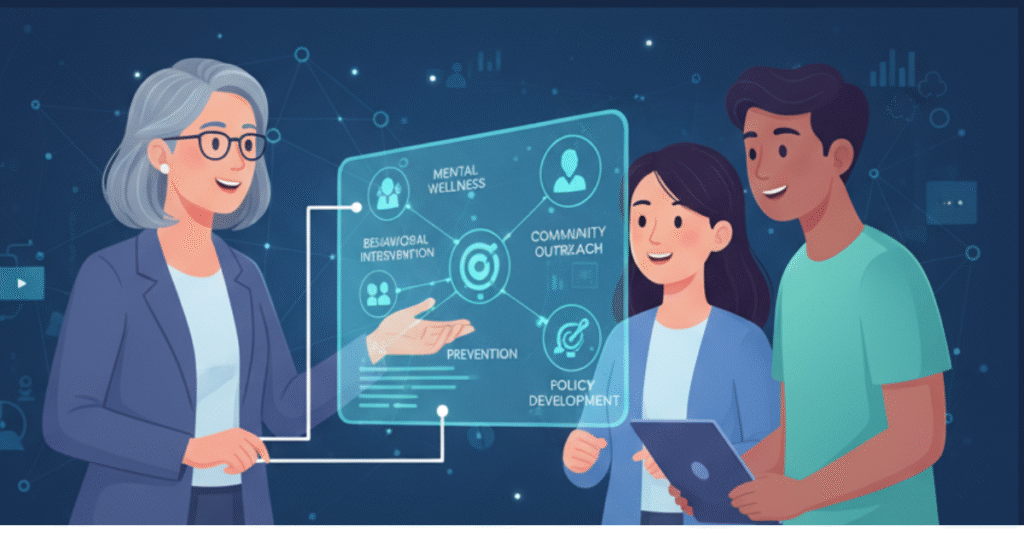
Psychology professors are associated, naturally enough, with the academic setting. And while their contributions therein are of great value, the way they apply to a more general segment of the population is not immediately apparent.
Yet there are, of course, major ways in which psychology influences public health. Think about the pandemic, for example. Yes, managing it did require experts in the Department of Infectious Disease, but managing an effective response was highly contingent on behavior. It’s to that end that psychology professors are uniquely qualified to positively influence public health in a way that extends beyond the purely academic.
Key Takeaways
- Psychology professors have deep expertise in human behavior, which is central to shaping effective public health strategies.
- Their skills in communication and behavior modification can improve crisis response, health campaigns, and policy development.
- With additional training, such as a CHES certification, psychology professors can transition into impactful public health roles.
- Public health challenges like obesity, substance abuse, and chronic disease are strongly linked to psychology, making their input vital.
- Shifting into public health can be a rewarding career move, offering opportunities to influence entire communities.
The Core Strengths of Psychology Professors
As we alluded to in the introduction, psychology professors are uniquely acquainted with the intricacies of human behavior. They understand from a mental perspective what it takes to positively influence the trajectory of human health. Naturally, psychology alone cannot shape public health policies, but it is an important and constant component that should always be factored in.
Psychology professors leverage concepts that are specifically designed to modify behavior. And while these are, in clinical settings, highly customized to individuals, they can be adapted at scale based on population data. Their experience in an academic setting is also valuable for communication, which is an important part of the job.
Again, remember the intricacies of safely navigating the pandemic? At that point in time, almost daily communications adjusted the way people behaved in their communities. Psychology professors, at least hopefully, will be skilled at delivering complicated information in an understandable package.
Specific Health Roles for Psychology Professors
It’s great to say that psychology professors will be an asset to public health, but what does that look like in terms of, say, an employment contract? What job are they doing? There are actual positions that already exist that could benefit from the insights of a psychology professor.
Program design and evaluation, for example, in which psychology professors work with other health professionals to identify and promote public health intervention programs that have the best chance of working. They could work on the policy development side of public health and advise lawmakers on how mental factors influence wider public health choices. They can handle crisis communication, developing guidelines during pandemics, natural disasters, and other large-scale health events. They could even participate in or help lead training programs for other government officials in the public health sector.
The transition may require additional education or training – for example, a CHES certification. CHES certifications are a general requirement for any person interested in entering public health. To that end, the suggestion that we are posing is not that any psychology professor can walk right out of the classroom and into a public health role, but rather that with additional training, their skills will be uniquely valuable to the communities that they serve.
Why This Matters
It’s important to understand that public health roles are active not only during very visible crises like COVID-19, though, for the record, they are still working to navigate that very specific problem. More often, however, they’re working on ongoing issues like obesity, the opioid epidemic, the rise in type 2 diabetes, or even environmentally related diseases. This is to say that there’s no shortage of work for them, even during times that to the majority of the population, feel ordinary.
Public health professionals, unfortunately, often have a heavy workload. And so many of the behaviors that they’re addressing – overeating, substance abuse, and more – are at least partially rooted in psychology.
Is It a Worthwhile Career Move?
That’s an interesting and separate kind of question. Sure, psychology professors could be excellent at public health, but they might also be the very best fry cooks on the block, and you probably won’t see an influx of applications from them at the local Dairy Queen.
Is this worthwhile for psychology professors from a career advancement perspective? Well, that really depends on what they’re trying to accomplish. The professional life of an established college professor can be pretty comfortable. Obviously, they work hard, but in a more flexible environment than the majority of professionals.
Even a full-time tenured professor might only spend about 20 hours a week on campus. The rest of the time, they will have work to do, but it won’t be as regimented as the work of someone working for a government agency.
They’ll also earn a six-figure salary at least at some point in their career if they are tenured at a major university. Public health professionals, at least in this context, are competitive with academic salaries. The work will probably be more time-consuming, or at least less flexible, than the responsibilities that academics are used to. You can’t, for example, do the equivalent of canceling class on a whim. But the work will be at least equally as rewarding, and possibly more so.
Here’s the bottom line: if you’re interested in doing high-leverage work that will impact the lives of literally hundreds of thousands of people – maybe even millions – transitioning into public health is an extremely worthwhile endeavor. It will be different than education. It may in many ways be harder. But you might just find it more fulfilling.
Obviously, that’s a subjective perspective. Being a college professor is also fulfilling. But if you’re interested in making a change and don’t know where to start, public health is an excellent direction to take.
Not only is the path to getting there relatively accessible, but the work will in many ways feel familiar once you get started.
Bottom line: if you’re a college psychology professor who wants to make a bigger impact on the wider world, consider a public health career.
Mariam holds an MS in Sociology with a specialization in Medical Sociology and Social Psychology. With a strong academic background and extensive research work in both fields, she brings depth and clarity to complex topics. Her writing explores the intersection of society, health, and the human mind, making academic ideas easy to grasp and relevant to everyday life.


